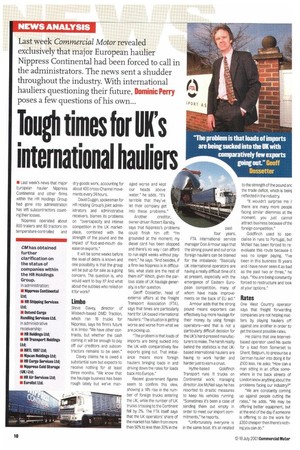Tough times for Urs international hauliers
Page 10

If you've noticed an error in this article please click here to report it so we can fix it.
• Last week's news that major European haulier Nippress Continental and other firms within the HR Holdings Group had gone into administration has left subcontractors counting their losses.
Nippress operated about 800 trailers and BO tractors on temperature-controlled and dry-goods work, accounting for about 400 cross-Channel movements every 24 hours.
David Duggin, spokesman for HR Holding Group's joint administrators and administrative receivers, blames its problems on "overcapacity and intense competition in the UK marketplace, combined with the strength of the pound and the impact of foot-and-mouth disease on exports."
It will be some weeks before the level of debts is known and one possibility is that the group will be put up for sale as a going concern. The question is, who would want to buy it? And what about the subbies who relied on it for work?
Limbo
Steve Davey, director of Wisbech-based DMD Traction, which ran 16 trucks for Nippress, says his firm's future is in limbo: "We have other contracts, but whether the cash coming in will be enough to pay off our creditors and subcontractors remains to be seen."
Davey claims he is owed a substantial sum but expects to receive nothing for at least three months. "We know that the haulage business has been rough lately but we've man
aged worse and kept our heads above water," he adds. "It's terrible that they've let their company get into these problems."
Another creditor, owner-driver Robert Barsby, says that Nippress's problems could finish him off: "I'm grounded at the moment: my diesel card has been stopped and there's no way I can afford to run eight weeks without payment," he says. "And besides, if a firm like Nippress is in difficulties, what state are the rest of them in?" Which, given the parlous state of UK haulage generally, is a fair question.
Geoff Dossetter, head of external affairs at the Freight Transport Association (FTA), says that times are particularly hard for UK-based international hauliers: "The situation is getting worse and worse from what we are picking up.
"The problem is that loads of imports are being sucked into the UK with comparatively few exports going out. That imbalance means more foreign hauliers bringing loads in and driving down the rates for loads back into Europe."
Recent government figures seem to confirm this view, showing a 14% rise in the number of foreign trucks entering the UK, while the number of UK trucks crossing to the Continent fell by 2%. The FTA itself says that the UK operators' share of the market has fallen from more than 50% to less than 30% in the past four years.
FTA international service manager Don Armour says that the strong pound and cut-price foreign hauliers can be blamed for the imbalance: "Basically UK international operators are having a really difficult time of it at present, especially with the emergence of Eastern European competition, many of whom have made improvements on the back of EU aid."
Armour adds that the strong pound means exporters can effectively buy more haulage for their money by using foreign operators—and that is not a particularly difficult decision for the UK's hard-pressed manufacturers to make. The harsh reality behind the statistics is that UKbased international hauliers are having to work harder and harder just to earn a crust.
Hythe-based Goldfinch Transport runs 11 trucks on Continental work; managing director Joe McNeil says he has resorted to drastic measures to keep his vehicles running: "Sometimes it's been a case of sending them out empty in order to meet our import commitments," he reports.
"Unfortunately everyone is in the same boat. It's all related to the strength of the pound anc the trade deficit, which is being reflected in the industry.
"It wouldn't surprise me ii there are many more peoplE facing similar dilemmas at the moment; you just cannot attract business because of the foreign competition."
Goldfinch used to specialise in runs to Portugal, but McNeil has been forced to reevaluate this route because it was no longer paying. "I've been in this business 15 years and I have never seen it as bad as the past two or three," he says. "You are being constantly forced to restructure and look at your options."
Rates
One West Country operator says that freight forwarding companies are not helping matters by playing hauliers off against one another in order to get the lowest possible rates.
He claims that one Internetbased operator used his quote for a load from Somerset to Ghent, Belgium, to pressurise a German haulier into doing it for £100 less. He asks: "How can a man sitting in an office somewhere in the back streets of London know anything about the problems facing our industry?"
"We are constantly coming up against people cutting the rates," he adds. "We may be offering better equipment, but at the end of the day if someone is offering to do the work for £350 cheaper then there's nothing you can do."








































































































